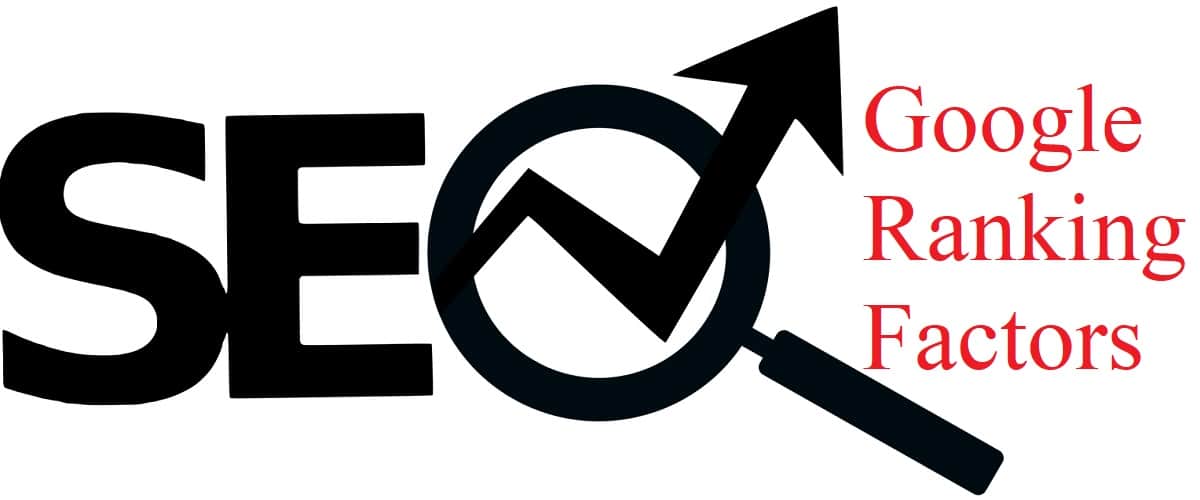In today’s digital landscape, achieving prominence on Google search results is crucial for businesses and websites. Ranking highly on Google translates to increased visibility, organic traffic, and an uptick in customers. This article delves into the intricacies of Google’s ranking algorithm, exploring the most significant factors that influence where your website appears in search results.
We’ll navigate through various categories of ranking factors, providing insights into how each element contributes to your website’s ranking success. By understanding these factors and implementing effective strategies, you can equip your website to climb the Google ladder and reach your target audience more effectively.
Google Ranking Factors
Content Quality

Content quality stands as a cornerstone of Google’s ranking algorithm. It directly reflects your website’s value and relevance to users searching for information.
Your content should be relevant, informative, unique, and engaging for good content quality and demonstrate expertise, authoritativeness, and trustworthiness (E-A-T).
Exploring Factors For Good Content Quality
Content is relevant when it directly addresses the search intent behind user queries. Informative content offers valuable and insightful information that educates, entertains, or solves problems for your audience.
Unique content means avoiding plagiarism, while engaging content requires you to captivate your audience with well-written, clear, and concise content.
Expertise, authoritativeness, and trustworthiness (E-A-T) is a concept created by Google. This means that content should be from credible sources with established expertise in the field. You can demonstrate your knowledge and authority by citing reliable sources, showcasing relevant experience, and maintaining a professional tone.
You can further enhance your content’s value by incorporating engaging elements like high-quality videos showcasing your products in action. WooCommerce Product Videos allow you to seamlessly integrate product videos directly into your product pages, providing a richer and more informative experience for potential customers.
Content Length
Content length is another content-related Google ranking factor. We’ll look at this in detail now:
Factors that Influence Content Length
The following factors influence your content length:
- Comprehensiveness: Longer content often allows for a more in-depth topic exploration, leading to better user satisfaction and engagement.
- Keyword Coverage: Extended content provides more opportunities to naturally integrate relevant keywords throughout the text, improving search engine understanding of your content’s relevance.
- Backlinks: Longer, high-quality content often attracts more backlinks from other websites, which is a significant ranking signal.
Tips to Remember
It’s crucial to remember that quality always trumps quantity. You shouldn’t prioritize length over substance—also, match length to user intent. You must tailor your content length to the specific needs of your audience and the search query.
Mobile-Friendliness

In today’s mobile-dominated world, ensuring your website is mobile-friendly has become essential to Google ranking. Google prioritizes websites that offer optimal user experience on mobile devices, recognizing the shift in user behavior towards browsing and searching primarily through smartphones and tablets.
Why Mobile-Friendliness Matters
Now, let’s discuss some reasons why your website’s mobile-friendliness matters. First, keep in mind that Google primarily uses the mobile version of your website for indexing and ranking purposes. If your website isn’t mobile-friendly, it might be disadvantageous compared to competitors with optimized mobile experiences.
Secondly, Google prioritizes websites that offer a positive user experience for all visitors, including those on mobile devices. A website that is difficult to navigate, slow to load, or requires zooming and scrolling on mobile screens will likely have a higher bounce rate and lower user engagement, ultimately impacting ranking.
Also, mobile-friendly websites ensure equal access to information for all users, regardless of their device. Google values accessibility and prioritizes websites that cater to diverse user needs and devices.
BackLinks

Backlinks, or inbound links, are hyperlinks on other websites that point back to your website. They signify that another website finds your content valuable and relevant enough to link to. In the world of Google ranking, backlinks hold significant weight as an influential ranking factor.
The Importance of Backlinks
Backlinks from high-quality, authoritative websites signal to Google that your website is trustworthy and reliable. The more reputable websites link to you, the stronger your website’s authority appears in the eyes of search engines. Also, Backlinks from thematically relevant websites indicate that your content aligns with the topic of the linking website.
Furthermore, backlinks allow users to discover your website, increasing traffic and visibility.
Effective Strategies For Building High-Quality Backlinks
To build high-quality backlinks, you must create high-quality content, guest post on relevant websites, participate in online communities, and identify broken links to replace them with your links. See here the best ways to build backlinks.
Keyword Optimization

In SEO, keyword optimization ensures your website resonates with search engines and reaches your target audience. Keywords are the terms and phrases users enter into search engines to find information and strategically incorporating them into your website content helps search engines understand your content and its relevance.
Importance of Keyword Optimization
Keyword optimization is of paramount importance for your website. This is because keywords act as signals to search engines, helping them match your content with relevant search queries. So, you must use relevant keywords strategically throughout your website. Doing this increases the chances of your content appearing in search results for those specific keywords.
Also, effective keyword optimization enhances your website’s visibility in search engine results pages (SERPs). While targeting keywords is essential, it’s crucial to prioritize natural language and user experience. Keyword stuffing or unnatural keyword placement can negatively impact user experience and harm your ranking.
Best Approach to Keyword Optimization
You can approach keyword optimization effectively by researching keywords, incorporating them naturally, focusing on user keyword intent, and incorporating long-tail keywords within your content.
Anchor Text

For SEO, anchor text influences how search engines perceive your website and its content. It’s the visible, clickable text associated with a hyperlink, guiding users to another webpage or document. While seemingly simple, anchor text is significant as a subtle, impactful ranking factor.
Significance of Anchor Text
Anchor text is a contextual clue for search engines, providing additional information about the linked webpage. Descriptive and relevant anchor text helps search engines understand the topic and content of the linked page, influencing its ranking for related search queries.
Moreover, informative anchor text enhances user experience by clearly indicating what users can expect upon clicking the link. Anchor text plays a crucial role in link building, too. Backlinks with relevant and descriptive anchor text from authoritative websites signal to search engines the credibility and value of your content, boosting your website’s ranking.
Getting The Right Anchor Text
Not all anchor text is equal. You must have relevant anchor text, avoid keyword stuffing, and use various anchor text.
Page Speed

In today’s fast-paced digital world, page speed has become a critical factor for user experience and ranking well in Google search results. Users expect websites to load quickly and seamlessly, and Google prioritizes websites that deliver a smooth browsing experience.
Importance of Page Speed
Page speed is crucial for your website, as Google prioritizes websites that offer a positive user experience. Slow page loading speeds can lead to frustration, high bounce rates, and decreased engagement, negatively impacting your website’s ranking potential. You can improve your page speed by optimizing images, minimizing code, enabling browser caching, utilizing a content delivery network (CDN), and optimizing server performance.
Benefits of Improving Your Page Speed
By improving your page speed, you can reap the following benefits:
- Enhanced user experience
- Improved search engine ranking
- Increased conversion rates
Alt Text

While often overlooked, alt text (alternative text) is crucial in SEO (Search Engine Optimization) and accessibility. It’s the hidden text description associated with an image on your website, providing context and meaning for users who cannot see the image or search engines that rely on text to understand the content.
Significance of Alt Text
Alt text is crucial for visually impaired users who rely on screen readers to access information. Descriptive alt text allows them to understand the content and purpose of images, ensuring they have an equal experience on your website. Additionally, alt text provides search engines valuable contextual information about your images’ content. This helps search engines index and understand your website more effectively, improving your ranking for relevant image search queries.
Going further, well-written alt text can enhance user engagement by piquing curiosity and providing additional information about the image. This encourages users to spend more time on your website and explore your content further.
Crafting Effective Alt Text
Compelling alt text must be accurate, relevant, concise, clear, and focused on user experience. Also, strategically incorporate relevant keywords into your alt text, but avoid keyword stuffing.
Conclusion
Understanding and optimizing for Google’s ranking factors can feel like navigating a complex maze. However, by prioritizing high-quality content, user experience, and technical SEO best practices, you can equip your website to climb the search engine ladder and reach your target audience effectively.
Remember, this journey is a continuous process, requiring ongoing monitoring, adaptation, and refinement of your strategies. Embrace the learning curve, stay informed about evolving ranking factors, and focus on delivering exceptional value to your users. Doing so can establish a strong foundation for long-term SEO success and achieve greater visibility in the ever-competitive digital landscape.
Inam Ullah Dar is a content writer by passion and profession. He started his journey with Motif Creatives. He primarily writes for guest post articles falling under various niches. The main area of his interest and expertise is Web design & Digital marketing. He enjoys reading and writing about healthcare, mindfulness, and well-being to educate people about being happier and lively. His work has been published on many high-authority websites. He believes that writing is an effective way to communicate at better levels.



PPC VS SEO: Which One Should You Go for?
What is link juice in SEO, and how can you acquire it?